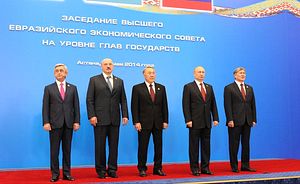Leaders from the Eurasian Economic Union are set to meet on April 8 in Yerevan, Armenia. But in light of the recent heat-up of that country’s frozen conflict with neighboring Azerbaijan over Nagorno-Karabakh, the union’s other members are looking for a change in venue. The EEU encompasses Russia, Kazakhstan, Belarus, Armenia and Kyrgyzstan.
RFE/RL reported that Kazakhstan Prime Minister Karim Masimov would not be attending the summit in Yerevan. Masimov suggested a change of venue to Moscow, which the Russian cabinet echoed.
The present tensions in Nagorno-Karabakh were the subject of an April 6 phone call between Kazakh President Nursultan Nazarbayev and Russian President Vladimir Putin. The two also, according to the Kremlin’s readout of the call, “examined the timetable of upcoming events, including a meeting of the Supreme Eurasian Economic Council.”
Armenia’s conflict with neighboring Azerbaijan–which is not a member of the EEU but does have close relations with Kazakhstan–was a thorn in the union’s side since inception. Casey Michel wrote in January 2015, days after the EEU’s official launch, that it “entered into force in a near-stillborn state” not the least because of conflicting interests between members. There has been dickering over various aspects of the union, particularly customs borders, but notably Nagorno-Karabakh–even in its frozen state–was a problem for Kazakhstan. Michel in October 2014 noted that early on Kazakhstan had blocked Armenia’s accession to full membership:
According to all reports, Kazakhstan has stood by its stance. In the meantime, Armenia has experienced – or caused, depending on your interpretation – delay upon delay in the process of accession, much to Putin’s chagrin. And with only a few days remaining until the October 10 proposed promotion of Armenia to full membership, the question becomes all the more pressing.
It’s also become all the more confusing. On September 25, reports began surfacing that Armenia had swallowed Kazakhstan’s resistance and would be leaving Nagorno-Karabakh outside the EEU’s customs borders.
The news that Kazakhstan plans to skip the EEU meeting if its in Armenia should cause a certain degree of deja vu for regional watchers. Last year in March, as the leaders of the 3-month-old EEU planned to gather in Astana, Armenia announced its president wouldn’t be attending. The summit, which the Kazakh, Russian and Belarusian presidents were all set to attend March 12-13 in the Kazakh capital, was pushed back to March 20. Armenia’s President Serzh Sarkisian didn’t attend, he was in Brussels.
Whether the EEU summit–which was to bring together the prime ministers of the five EEU states–will be moved is uncertain. Kazakhstan’s reluctance to attend is likely in order to avoid the pretense of endorsing the Armenian side in the ongoing Nagorno-Karabakh conflict. A photo of the EEU prime ministers smiling in Yerevan wouldn’t play well in Baku, with which the other members of the Union have decent, if not close, relations. Although a ceasefire was agreed recently, Azerbaijan says it has been violated 115 times in the past 24 hours.
































